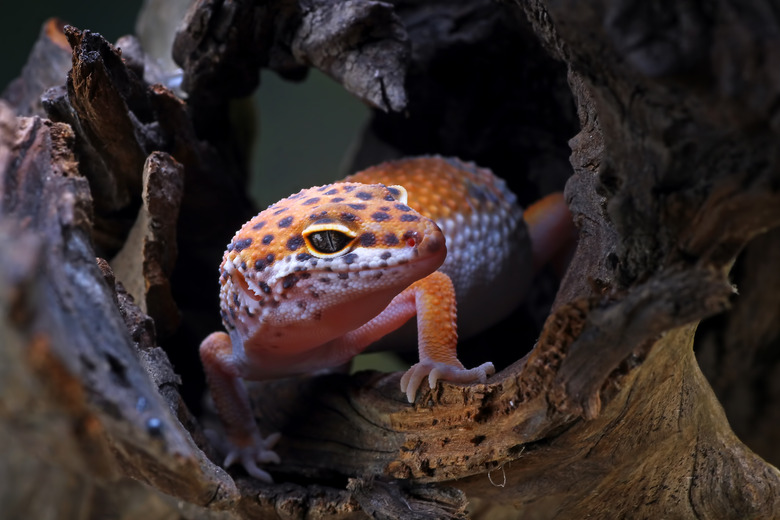What Do Baby Geckos Eat?
Unlike many reptiles that exhibit ontogenetic or age-related dietary shifts, most neonate geckos eat the same type of food as adult geckos do. However, baby geckos' small size limits the size of the prey they can capture, overpower and ingest safely.
Leopard geckos (Eublepharis macularius), tokay geckos (Gekko gecko), African fat-tailed geckos (Hemitheconyx caudicinctus), and other carnivorous gecko pet species consume small invertebrates, while omnivorous species, such as day geckos (Phelsuma spp.) and crested geckos (Correlophus ciliatus), add soft fruits and nectar to their diet. Always consult a qualified reptile veterinarian before making significant dietary changes.
Insect foods for baby geckos
Insect foods for baby geckos
Whether or not they supplement their diets with plant products, most baby geckos eagerly consume insects and other small arthropods. Crickets and roaches are excellent staples, but you must offer other bugs, such as roaches, mealworms, superworms, silkworms, soldier fly larvae, and wax worms, to ensure your pets have a well-rounded diet. Superworms and mealworms have higher fat content than crickets, roaches, and superworms do, so offer them only in moderation—perhaps once per week.
Feed leopard geckos two appropriately sized insects for every inch of your gecko's length, every other day. For example, a 3-inch-long leopard gecko will need about six crickets three or four days per week. Geckos consuming a significant quantity of plant-based or commercial foods require only a fraction of this quantity.
Plant-based foods for baby geckos
Plant-based foods for baby geckos
Day geckos, crested geckos, and a few other gecko pet species include fruits, flowers, nectar, and similar foods on their menu, along with the insects that carnivorous gecko species eat. Accordingly, you can provide these omnivorous species with occasional fruit treats.
Offer your lizard very small pieces of papaya, figs, and raspberries—all of which have an appropriate calcium-to-phosphorus ratio. Small pieces of grapes, blackberries, mango, watermelon, pineapple, apples, dates, strawberries, and pears are also suitable treats, but they have less ideal calcium to phosphorus ratios. Regardless of your gecko's age, avoid feeding him star fruit, citrus, or avocado, as these fruits can cause health problems over the long term.
Fruit treats should represent no more than 10 percent of your pet's diet. Remove all plant-based foods after 24 hours to prevent spoilage. Old fruits and vegetables may attract fruit flies and other pests.
Baby food and commercial products
Baby food and commercial products
Some hobbyists offer fruit-flavored baby foods to their omnivorous baby geckos. Some specimens relish these products. Offer a dab about three times per week — but know that baby food does not provide suitable nutrition for geckos.
Experienced hobbyists who keep lizards for pets strive to overcome such deficiencies by supplementing baby food with vitamins and minerals—but, as the exact nutritional requirements of most reptiles are poorly understood, efforts often amount to little more than semi-educated guesswork.
Commercial powdered gecko foods, mixed with water, yield a pasty food similar to baby food. Their manufacturers claim these products are fortified to provide a balanced diet, thereby making them preferable to baby food. Several breeders have successfully raised multiple generations by feeding their lizards such foods exclusively.
Safe food practices
Safe food practices
It is imperative to provide your tiny lizards with suitably small foods; large items may block or damage their digestive systems, ultimately causing painful death. Opt for smaller sizes whenever you are in doubt, as geckos will eat smaller insects that do not represent an impaction risk. As a rule of thumb, each food item should be no longer than the length of the gecko's head.
Two-week-old crickets or small mealworms are usually suitable for hatchling geckos, but very small species and specimens require even smaller feeders. Be sure to remove any insects left roaming in the cage about an hour after feeding time to prevent them from chewing on your lizard and causing stress. You can leave mealworms or similar bugs in a feeding dish overnight, as long as they cannot escape.
Gut loading insects
Gut loading insects
Many commercial insect breeders feed their bugs nutritionally poor diets. To keep your gecko in peak condition, you must correct this deficiency by feeding the insects a nutritious diet for at least 12 hours before offering them to your lizard. This is called gut loading.
Whole grains and dark leafy greens make great staples for most feeder insects. Water-rich fruits, such as oranges and celery, satisfy the bugs' hydration needs, alleviating the need for you to provide an unsanitary water dish.
